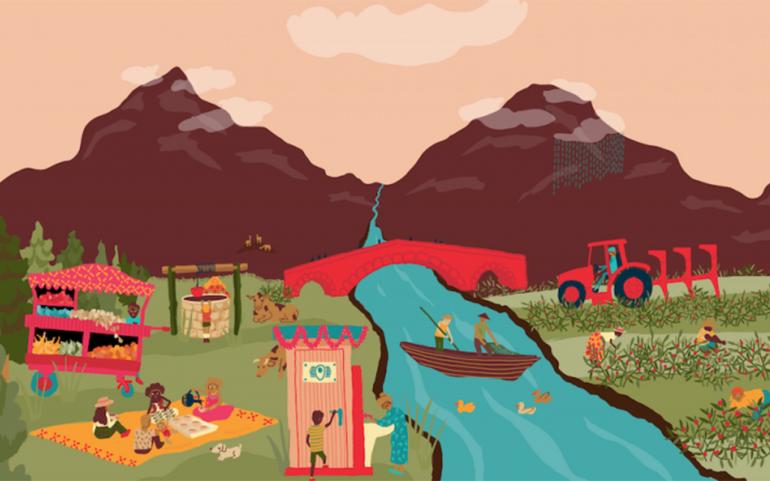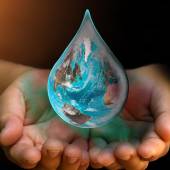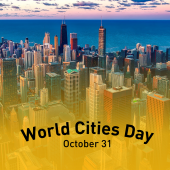Groundwater: making the invisible visible

World Water Day on March 22
The UN celebrates World Water Day on March 22, drawing attention to the importance of groundwater and saving it from visible and invisible threats.
In 2022, the focus is groundwater, an imperceptible asset with an effect apparent all over the place.
Groundwater is water observed underground in springs, which are land developments of rocks, sands, and rock that hold significant amounts of water.
Groundwater takes care of springs, streams, lakes, wetlands and saturates seas. Groundwater is re-energized principally from downpour and snowfall penetrating the ground. Groundwater can be extricated to the surface by siphons and wells.
Life wouldn't be imaginable without groundwater. Most bone-dry regions of the world rely totally upon groundwater. Groundwater supplies an enormous extent of water for drinking, sterilization, food creation, and current cycles.
It is vital to the working of environments, like wetlands and streams.
Groundwater needs to be shielded from overexploitation - abstracting more water than is re-energized by downpour and snow - and the contamination that currently torments it.
Investigating, safeguarding, and economically utilizing groundwater will be vital to getting by and adjusting to environmental change and addressing the necessities of a developing populace.
Governments in Asian countries should encourage and promote more effective conservation efforts, greater environmental awareness, and recognize that all people have a basic need and right to clean fresh water.
The idea for World Water Day emerged at the United Nations Conference on Environment and Development in Rio de Janeiro in Brazil in 1992. And in 1993 onwards, the UN began to stress the importance of freshwater.
The aim was to celebrate water and raise awareness that 2.2 billion people lived with no access to water security. The core focus of World Water Day is to support the accomplishment of Sustainable Development Goal 6 of the UN: water and sanitation for all by 2030.
According to the International Institute for Applied Systems Analysis (IIASA) research, Water Program in 2018, 4.5 billion Asians used 65% of the world’s water supply. Among them, about 30% of Asians are facing water scarcity.
According to the Asia-Pacific Center for Security Studies (APCSS), many Asian countries are beginning to experience moderate to severe water shortages brought on by the simultaneous effects of agricultural growth, industrialization, and urbanization.
Today, water is under outrageous danger from a developing populace, expanding requests of agriculture and industry, and the demolishing effects of environmental change.
Sylvia Alice Earle, an American marine biologist and National Geographic explorer, said, “No water, no life, no green, no blue.”
The worth of water is substantially more than its cost - water has a colossal and complex incentive for our families, culture, well-being, schooling, financial matters, and the honesty of our shared habitat.
In his Encyclical Letter Laudato Si, Pope Francis said, “Fresh drinking water is an issue of primary importance since it is indispensable for human life and for supporting terrestrial and aquatic ecosystems.”
Pope Francis continues, “Sources of freshwater are necessary for health care, agriculture, and industry. Water supplies used to be relatively constant, but now in many places, demand exceeds the sustainable supply, with dramatic consequences in the short and long term.”
“Large cities dependent on significant supplies of water have experienced periods of shortage, and at critical moments these have not always been administered with sufficient oversight and impartiality,” said the Pope.
I recall my visit to a village called Peinnegone located on an Island in Ayeyarwady Region in Myanmar. People on the Island do not have fresh water. They have only saltwater from the sea. There is no purified drinking water at all. For this reason, they store rainwater in a reservoir and use it as drinking water.
It expresses that Myanmar is included in the Asian countries where freshwater is one of the main issues.
Radio Veritas Asia (RVA), a media platform of the Catholic Church, aims to share Christ. RVA started in 1969 as a continental Catholic radio station to serve Asian countries in their respective local language, thus earning the tag “the Voice of Asian Christianity.” Responding to the emerging context, RVA embraced media platforms to connect with the global Asian audience via its 21 language websites and various social media platforms.













